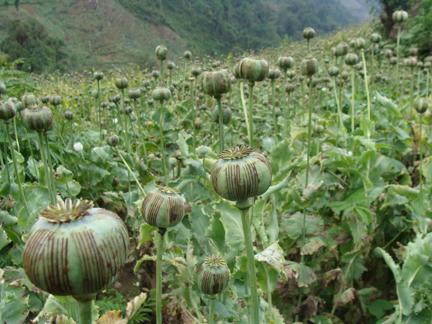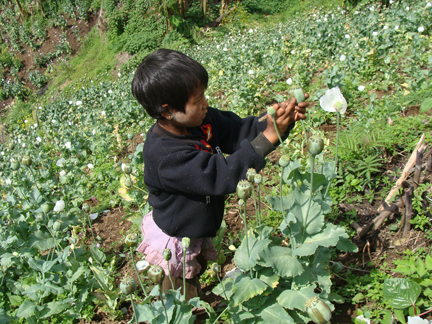A large group of students, ages 8 to 15 years old, dressed in dirty clothes and with unkempt appearance, rush from classrooms as soon as the afternoon bell rings in Sa Don Village, in Wine Maw Township, in Kachin State...
A large group of students, ages 8 to 15 years old, dressed in dirty clothes and with unkempt appearance, rush from classrooms as soon as the afternoon bell rings in Sa Don Village, in Wine Maw Township, in Kachin State.
 They are not on their way home or to play with their friends, however. Instead, they hurry to the forest 30 minutes away, anxious to start working.
They are not on their way home or to play with their friends, however. Instead, they hurry to the forest 30 minutes away, anxious to start working.
They are going to pick orchid plants in the forest to sell them.
This is a new business venture for the people in the Sa Don area, which has been the largest poppy producing area in Kachin State since 2004.
They depended on poppy sales to make a living because of high-unemployment, especially for young people, mainly due to an ineffective educational system.
However, that changed in October, last year, when the Kachin Independence Organization (KIO) issued an order prohibiting poppy production in Sa Don as part of a renewed effort to end the drug trade in this disputed area of Kachin State.
Currently, KIO troops are attempting to destroy poppy fields at the same time Burmese Army and junta controlled Border Guard Force soldiers are offering to protect the crops for cash.
The KIO’s order notwithstanding, many local farmers say they are determined to switch to another crop for their own reasons, including widespread drug use and addiction by young people.
They say young people frequently eat raw opium while working in the fields. Many become addicted to opium.
According to a traveling medical doctor, local youths use heroine, methamphetamine and cough relief medicines laced with morphine, as well as opium.
He said he saw a quantity of raw opium, the size of fist, on the bed in a house he stayed at. He handed over it to the house owner, who proudly said that her child, age 7, extracted it.
“Young children help their parents extract raw opium from the poppy plants. They don’t think opium is dangerous,” the doctor said.
 Community leaders worry the drug abuse is leading to widespread truancy and poor grades in local schools, which are not popular already because they are underfunded and underequipped by the government. Many parents say that has lead to widespread unemployment, especially among the youth.
Community leaders worry the drug abuse is leading to widespread truancy and poor grades in local schools, which are not popular already because they are underfunded and underequipped by the government. Many parents say that has lead to widespread unemployment, especially among the youth.
“They have fallen behind in Burmese, English and Math subjects. Their parents don’t encourage them to spend time studying,” a school teacher said.
That’s because some children and some parents argue education cannot fill their stomachs- but working on the opium plantations has.
Many farmers still feel, however, the social cost of growing opium is too high. So, they are attempting to find new cash crops.
One local farmer said some are attempting to grow walnut plants, tea-leaf plants and seasonal fruit plants- including Chin Zaokar (similar to Avocado).
Some locals are working on rubber and agar wood plantations.
And, many are scouring the forest for orchids.
That decision has been costly, however.
For example, the people in the area were paid 350,000 kyat (around $350 USD) for 1.5 kilograms (1viss) of raw opium by opium traders who resold it, mostly to Chinese importers, for twice that amount.
Comparatively, they are paid 80,000 kyat ($80 USD) for the same weight of orchids.
Despite that shortfall, however, many say they are getting out of the poppy growing business.
“Now we cannot grow poppy. So, our incomes are not enough for our family,” a farmer told the Kachin News Group in a recent interview.
“Producing drugs is not useful for us. There are many unemployed. We face many difficulties. Nobody comes to help us. But, we won’t grow poppy plants.”



